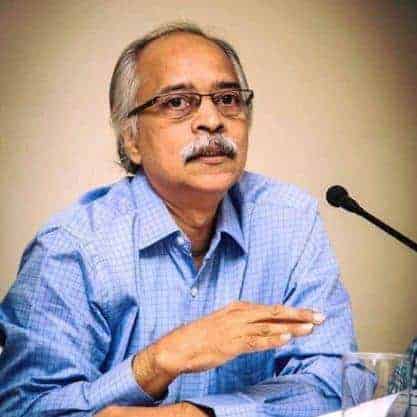
The passing away of Jaswant Singh, the multi-faceted politician, former External Affairs Minister, on September 27, in a way, marks the end of the ‘political triumvirate’ in the BJP led, National Democratic Alliance (NDA), who were instrumental for the nuclear tests of Pokhran-2 in 1998.
Jaswant Singh, 82, was in coma for the last about six years.
The triumvirate consisted of Prime Minister A B Vajpayee, Defence Minister George Fernandes and Jaswant Singh. There were a handful more, politicians and scientists, who were in the know of the top secret mission which was code named, ‘Operation Shakthi’.
Call it a strange coincidence or irony, all three, went into a state of semi or ‘comatose’ and passed away into history. Vajpayee died in August 2018 at age 93, Fernandes in January 2019 at age 88 and Jaswant in at the age of 82. While, Jaswant was the most vocal, George, who was present at Pokhran was passive, post the blasts.
India’s nuclear blasts at Pokhran in the Rajasthan deserts in May 1998, created ripples globally. The Vajpayee led NDA Government declared itself a Nuclear State while the US led Nuclear Supply Group (NSG), imposed sanctions and refused to recognise India an entry into the Group.
So, the Vajpayee Government’s euphoria, which it could keep alive within the country was short lived outside. The US imposed sanctions both in technology access and economic front and questioned the scientific validity of the tests led jointly by R Chidambaram, Chairman of the Atomic Energy Commission (AEC), APJ Abdul Kalam, Chief of the Defence Research Development Organisation (DRDO) which was coordinated by Dr R Santhanam.
Prime Minister Vajpayee quickly turned to his ‘Man Friday’, Jaswant Singh to do the ‘trouble shooting’ and convince the world that India’s tests were for peaceful purposes and in confirmation with the principle of No first Use. As a trusted associate of the PM and articulate leader, Jaswant, who was Deputy Chairman of the Planning Commission undertook the mission and travelled to the US and other countries engaging leaders in discussions as ‘special emissary’.
Though not a minister, Jaswant Singh was among perhaps a dozen people in the know of the Pokhran-2 tests of May 11 and 13, 1998 (PM, George Fernandes, Home Minister, LK Advani, NSA, Brajesh Mishra, Dr R Chidambaram, APJ Abdul Kalam, Dr Santhanam, Dr Anil Kakodkar etc). He was made the External Affairs minister after Vajpayee won for the second time in 1999.
His intense, friendly, frequent, multi locational and long drawn discussions with Strobe Talbot, the US deputy secretary of State. starting a month after the historic May 11, 1998, and lasting for over two years, have gone a long way in shaping the favourable stance that the US took in the years that followed. Singh-Strobe dialogues are part of contemporary nuclear history books.
Interestingly, the Dr Manmohan Singh led, United Progressive Alliance (UPA), signed the Indo-US Nuclear Deal with the US President, George W Bush Jr in 2006. It’s a different matter that the deal itself has not made much headway in its intent and agreements.
Jaswant Singh, a multifaceted personality, came from a royal family, did a stint in the Army, held liberal views, had no connection with the RSS, but enjoyed the confidence and closeness with PM, Vajpayee. Be it the historic Bus Visit to Lahore of Vajpayee, his own trips to Pakistan, Gen Musharraf’s talks in Agra, the infamous personal handover of JeM terrorists in exchange of 160 passengers to the hijackers of the Air India flight in Kandahar, Afghanistan, Jaswant was a key confidante of the PM.
No wonder, that Vajpayee gave him the additional charge of Defence Ministry in 2001, when George Fernandes resigned in the face of severe criticism from the Opposition. Thereafter, he was entrusted with the Finance Ministry in 2002, with Yashwant Sinha, moved to External Affairs. As Finance Minister, under the ‘India Shining’ campaign of the NDA in 2004, he presented a ‘Populist’ budget with lot of cheer for the salaried and poor. However, it failed to impress and the Vajpayee Government lost power.
Though, he continued to be an MP in the Rajya Sabha, Jaswant started losing out in the BJP as Vajpayee’s health deteriorated and LK Advani’s hold loosened. His own liberal stance did not go well with the rising leaders within the BJP like Narendra Modi. His antipathy with the RSS from the beginning made matters worse. His book on Jinnah, India, Partition and Independence in 2009, created ripples, but virtually sealed his fate in the party. He was expelled at the initiative of Modi, who was the Chief Minister of Gujarat.
However, the great survivor that he was, Jaswant managed to return to the BJP and emerge as the NDA’s candidate for Vice President in 2012, but lost to the incumbent Dr Hamid Ansari. Denied a party ticket, Singh contested from Barmer in 2014 as an Independent and lost to the BJP candidate. Coincidentally, he suffered a bad slip in his bathroom the day of the announcement of his defeat which pushed him into comatose. He never recovered.
Somasekhar Mulugu, former Associate Editor & Chief of Bureau of The Hindu BusinessLine, is a well-known political, business and science writer and analyst based in Hyderabad.

